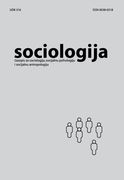Pozitivni i negativni aspekti društvenog kapitala - slučaj postkomunističkih društava
Positive and Negative Aspects of Social Capital - The Case of Postcommunist Societies
Author(s): Olivera PavićevićSubject(s): Social Sciences
Published by: Sociološko naučno društvo Srbije
Keywords: social capital; generalized trust; reciprocity; informal networks; communism
Summary/Abstract: The paper analyzes social capital`s properties in relation with the level at which it is generated, as a type of social capital. The second part of the paper is dedicated to examining of possibilities for implementation of the concept of social capital in various social and political circumstances. Analysis of the Putnam`s concept of social capital in reviewing of the process of democratization of post-communist societies has shown that assessment of the social capital’s role in democratic transition of these societies must take into account specific social and political circumstances which influenced social capital`s trends and forms. In contrast to economically developed societies with long democratic traditions, it turned out that social capital in former communist societies developed and moved in almost opposite directions. It is characterized by competitiveness, non-community spirit and exclusivity. This may be explained by predominant informal associating forms as a survival strategy in conditions of deprivation and ideological mobilization at the time of communist party states which during transition turned into suspicious conversions of various capital types. It is an open issue how much the social capital concept is applicable in post-communist societies of Eastern and Central Europe and how it should be designed for the purpose of adequate implementation in creating of social policies.
Journal: Sociologija
- Issue Year: 54/2012
- Issue No: 3
- Page Range: 501-526
- Page Count: 26
- Language: Serbian

